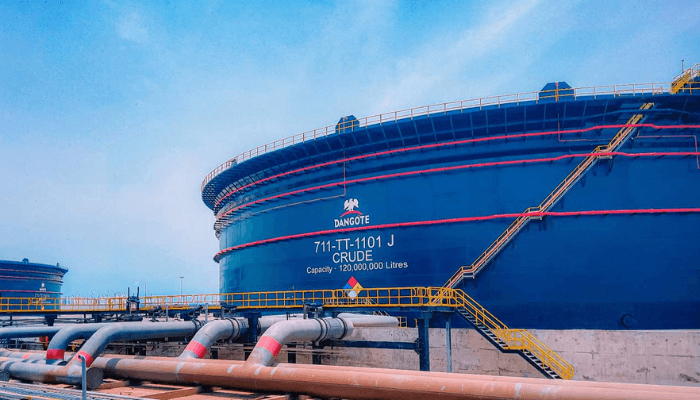By Paul Igbinoba
Copyright businessday

This article seeks to elaborate on the proposal in my article of last week, titled “A win-win strategy for Nigeria’s petroleum downstream sector (part two)”, which recommended that Dangote Refinery be made a ‘regulated monopoly’ for a maximum period of five years, during which time other petroleum refineries would have come on stream. To be certain, Dangote Refinery is not a ‘natural monopoly’ like a railway company, for example, where the requirements to lay extensive railway tracks and related infrastructure make allowing a competitor wasteful and very costly, or where the existence of a huge producer with extensive investment in plant and equipment that achieves economies of scale or a significantly lower average cost than one or two smaller competitors can create a market entry barrier. As I write, there are at least two refinery projects on the drawing board being promoted by local investors that have the potential to give Dangote Refinery formidable competition if they see the light of day within the next five years.
Read also: Dangote refinery halts self-collection of petroleum products
As I have opined in the past, the question of Dangote Refinery being a monopoly would not have arisen if Nigerian National Petroleum Corporation Limited’s (NNPCL) refineries were up and running. On the other hand, the sheer size of Dangote Refinery grants it massive monopolistic power, which cannot be ignored in the absence of another major local refiner. Also worthy of note is the disruptive impact of Dangote Refinery’s entry into the market on the one-hundred percent petroleum products import business model, which has long benefitted a great number of vested interests in the Nigerian downstream oil and gas sector. This is a welcome development as far as Nigeria’s national economic interests are concerned.
The mobilisation last week of the first 1000 CNG-powered fuel tankers by Dangote Refinery for direct supply of fuel to filling stations nationwide, which has triggered heightened acrimony between the refinery and key downstream petroleum operators, is in my view a justification for declaring the refinery a regulated monopoly, which is a single producer or service provider in a market whose pricing template is regulated by government to ensure sufficient profit and attractive return on investment (ROI), while at the same time, protecting the best interests of consumers and other key stakeholders in the market where the monopoly firm operates. In the evolving scenario in the Nigerian downstream petroleum sector, the government and the regulatory agency, in this case, the Nigerian Midstream and Downstream Petroleum Regulatory Authority (NMDPRA), cannot afford to remain aloof for too long. Some of the cogent reasons Dangote Refinery should become a regulated monopoly for a maximum period of five years include the following:
“Also worthy of note is the disruptive impact of Dangote Refinery’s entry into the market on the one-hundred percent petroleum products import business model, which has long benefited a great number of vested interests in the Nigerian downstream oil and gas sector.”
· Dangote Refinery and Petrochemicals should be considered as a critical national asset and protected in the national interest.
· It is the largest single greenfield investment in Nigeria ever, the largest single private investment and remarkably so by a local investor.
· It is therefore an investment that needs to be protected so as not to send a wrong signal to other prospective investors planning a scale of investment similar to the Dangote Refinery in the petroleum industry or other critical sectors of the Nigerian economy, including iron and steel.
· It has the capacity to totally transform the petroleum products supply chain, not only in Nigeria but in the entire West and Central Africa sub-regions.
· If this huge national asset is properly and proactively managed, it will serve as the anchor to reposition and transform the entire Nigerian economy into a vibrant economy with a stable and relatively strong naira and bring inflation down considerably over a relatively short period of time.
· The refinery came on stream at a critical juncture in Nigeria’s economic history when the downstream oil and gas sector was in a serious crisis after the abrupt removal of fuel subsidy on May 29, 2023.
· Without the Dangote Refinery, it is doubtful if the audacious economic reforms of President Bola Ahmed Tinubu in the downstream petroleum market and the foreign exchange market would have been as successful as they seem today. Inflation could have maintained an upward trend, and economic hardship would not have abated, as is slowly becoming the case today.
· Declaring Dangote Refinery a regulated monopoly for a maximum period of five years would also necessarily mean placing a ban on petroleum product imports, except when there is a shortfall in local production.
· A regulated monopoly status also means a regulated pricing template that guarantees the best interests of Dangote Refinery, consumers and all players in the market.
· Finally, a regulated monopoly status would require that Dangote Refinery give up its direct fuel supply scheme to cool tempers and enable it to concentrate on its core business as a petroleum products refiner.
Below is further elaboration on the benefits of making Dangote Refinery a regulated monopoly, in addition to the benefits enumerated in my article last week:
· We will begin to reap the larger benefits of the spirit of public-private partnership as the whole economy will receive a new lease of life.
· The Central Bank of Nigeria could begin to see more tangible results in its inflation-targeting effort with the prospect of inflation hitting single digits before the end of the tenure of the current government.
· Significant appreciation in naira exchange rates, combined with a sharp drop in inflation and increased food production as a result of improved security in the farms, increased budgetary allocation to the agricultural sector and adoption of more modern agricultural practices, including mechanisation and increased use of fertilisers, will crash food prices and considerably reduce economic hardship and enhance the quality of life of Nigerians for the first time in many years.
Read also: If refinery failed, I would have lost all my assets to banks – Aliko Dangote
· The expected significant appreciation of the naira exchange rates will reduce the price of a barrel of crude oil, which is priced in dollars in the international market, and lead to an across-the-board reduction in all locally refined petroleum products, as well as the price of liquefied natural gas (LNG) and electricity tariffs.
· The expected significant appreciation of the naira exchange rates, plus the plummeting of inflation, will lead to a reduction in the exodus of high-quality skills and talents from Nigeria, commonly called the ‘japa’ syndrome, and give the Federal Government a strategic response to the phenomenon. Hitherto, the government has appeared helpless, as the only effective response lies in a significant improvement in the fortunes of the Nigerian economy.
In conclusion, we can see the cross-cutting effects of the Dangote Refinery coming on stream and its being declared a regulatory monopoly on virtually all sectors of the Nigerian economy. The point needs to be repeated here that the most potent resource that the Federal Government has to turn the economy around and put it on the path of rapid and sustainable growth and development is not financial or material resources, as important as they are, but sound, innovative and audacious economic policies implemented with a strong political will.



